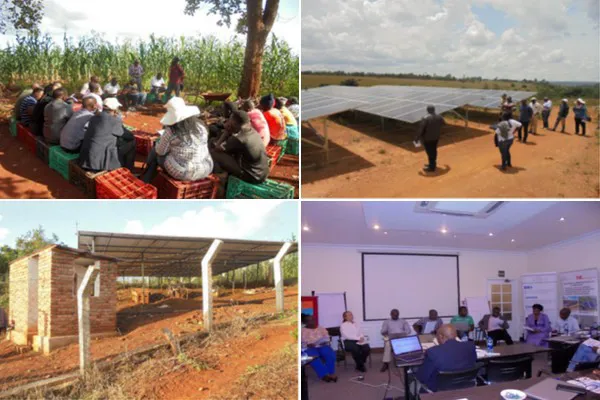Tanzania's horticultural sector presents significant opportunities for youth to earn lucrative incomes. However, the use of gasoline or diesel-powered irrigation pumps has negative environmental effects and is an expensive solution.
To mitigate climate change and increase agricultural productivity, the Tanzania Renewable Energy Association (TAREA) partnered with the Dutch Embassy and the Climate Response Facility (CERF) to implement the Climate Smart Agriculture Learning Event from February 27 to March 3. The initiative aimed to promote solar irrigation and targeted government officials from various Ministries and the National Irrigation Commission.
The team visited Jitume Group's 26-acre solar irrigation scheme in Lupembe Lwasenga on February 27. The Group previously used diesel pumps, costing TZS 70,000 per day, but switched to solar photovoltaic irrigation through the support of the ELICO Foundation. The farm grows maize, tomatoes, beans, green peas, and onions.
On February 28, the participants visited Kibidula Farm, owned by the Seventh Day Church, which has a 200-hectare irrigated area of the 1,000 hectares total. The farm grows avocados for export and local markets and relies on solar photovoltaic electricity for 95% of its irrigation needs. The irrigation system comprises a solar photovoltaic generator of 78kWp and 2 pumps with a capacity of 25kW.

Scaling up solar irrigation technology
On March 3, a workshop in Dar es Salaam brought together participants from the study visits, solar irrigation suppliers, and development partners. The workshop included plenary sessions and group work on scaling up the adoption of solar irrigation technologies.
Participants proposed several solutions, including strengthening coordination between actors, building capacity at all levels, and promoting renewable energy in national projects. The lessons learned from the event highlighted the viability of solar technology for large-scale irrigation, the cost-effectiveness of solar irrigation systems, the need for capacity building in solar irrigation, and the potential for public and private sectors to work together in promoting Climate Smart Agriculture practices.
TAREA proposed waiving Value Added Tax (VAT) for Solar Water Pumping Systems used by farmers for crop irrigation to make these systems more accessible to farmers. This move is expected to lower the cost of these systems significantly and promote wider adoption of solar pumping systems.
It is heartening to see TAREA, in collaboration with the Dutch Embassy and CERF, working towards promoting sustainable renewable energy technologies in Tanzania. The event's takeaways demonstrate that solar technology is a feasible option for irrigation in both large and small farms. TAREA's proposal to waive VAT for solar water pumping systems is expected to be a game-changer and promote wider adoption of these systems. The collaboration between public and private sectors in promoting Climate Smart Agriculture practices is a promising development, and we look forward to seeing more such initiatives in the future.
Source: agroberichtenbuitenland.nl
